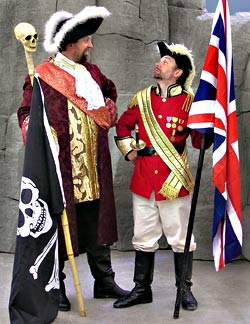Confronted with a purple passage like, “Speak out, I charge you by that sense of conscientiousness to which we have never yet appealed in vain,” plenty of Gilbert and Sullivan performers I’ve seen (and I’ve been a fan since junior high) treated it as an empty verbal flourish rather than an actual English sentence with dramatic point. A vital component of any G&S staging, and a strength of the Seattle Gilbert & Sullivan Society’s annual productions in particular, is that the players know, and are able to convey, what the words mean.
Sound simple? Maybe, but it’s rare. Get the words right, and the character interactions and motivations click, the jokes land, and the plot makes sense. (Its own kind of nonsensical sense, at any rate.) Thoughtfulness and understanding in every detail, combined with high production values, mark the Society’s offerings. They demonstrate that a traditionalist approach to G&S, taking the script and score as given and treating it with brains and imagination (including making enhancements where the authors allowed for it), can provide just as big a kick as any reworking—especially if the reworking comes with an implicit apology for the material, which can be deadly.
The Pirates of Penzance, from 1879, is to some extent a spoof on Verdian melodrama, the tale of a pirate apprentice who thinks he’s come of age, but soon discovers that, thanks to a calendrical anomaly, he hasn’t—he’s still indentured. Unfortunately, during his brief freedom, he falls in love. Which side will he take—piracy or respectability?
Leave it to librettist William S. Gilbert to make the former more fun. The actor charged with the line quoted above is Andrew Parks, making his company debut as the Pirate King, playing the part as I’ve always imagined it: Falstaffian and ursine, with a bass-baritone to match, rather than acrobatic in the style Kevin Kline established in the hyperactive 1983 film version. Local radio personality Dave Ross, in his 27th season with the company, underplays the Major-General masterfully—snappy, energetic, not too mannered. He continues the tradition of topicalizing Gilbert’s satirical patter–song lyrics, capping his entrance aria with a specially written verse, adding Super Bowl officiating and monorail building to the Major-General’s list of achievements. This whole grand and hilarious scene, especially at the insouciantly zippy tempo Ross takes, provided a lift and exhilaration I haven’t felt in a while from any musical performance.
To the role of Frederic, the pirate apprentice, Scott Rittenhouse brings a tenor sweet and secure, if not quite bold enough to withstand the onslaught of a drumroll. The women’s chorus (i.e., the Major-General’s daughters) visibly melted at his high B-flat. An even funnier musical joke comes with the overelaborate entrance cadenza of Mabel, Frederic’s paramour. Arthur Sullivan was as skilled as any bel canto opera composer at depicting a character through vocal ornament, and Cristina Villareale trumped this by adding her own touches to the high-wire act.
There’s one aspect, though, of the Society’s productions that each season becomes a little harder to overlook: their inability to muster an orchestra quite up to the level of the other production values. Its tone’s a bit undernourished (though with 27 players it’s probably authentic in size, comparable to the pit orchestra Sullivan had to work with), and its intonation can go sour. It doesn’t help that Pirates opens with one of the G&S canon’s least interesting overtures (one of the potpourris Sullivan asked an assistant to cobble together), and the show gets off to a wobbly start. No cash-strapped nonprofit wants to hear it ought to be spending more money on anything, but the gap in musical polish between pit and stage is only widening show by show as the Society’s casting strengthens vocally. It may take greater financial commitment to bring their productions that last degree of excellence.







